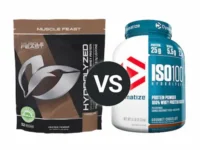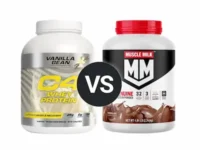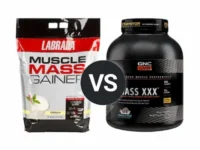Knowledge BaseYou're Questions Answered
Which whey protein is best for beginners?
For beginners looking to incorporate whey protein into their fitness or nutritional regime, choosing the right type of whey protein is crucial. Here are key aspects to consider when selecting a whey protein that suits your needs:
Types of Whey Protein:
- Whey Protein Concentrate (WPC): Typically contains lower protein content (around 70-80%) and higher levels of fats and carbohydrates. It's less processed, which may help in retaining beneficial nutrients. WPC is a good option for beginners due to its balanced nutritional profile and better taste, making it easier to adapt to if you're new to protein supplements1.
- Whey Protein Isolate (WPI): Higher in protein content (at least 90%) and lower in fats and lactose. WPI is ideal for those who are lactose intolerant or looking for a lower-calorie option. It's also beneficial for people who are cutting weight or who require a higher protein intake without the additional calories from fats and carbohydrates2.
- Whey Protein Hydrolysate (WPH): This form is pre-digested, allowing quicker absorption. WPH is recommended for those who need immediate protein synthesis, such as post-workout recovery. It's also suitable for individuals with sensitive stomachs3.
Consider Your Dietary Needs: If you have specific dietary restrictions, such as lactose intolerance or a low-fat diet, choosing a whey protein that aligns with these needs is essential. Isolates and hydrolysates can be more suitable for those with lactose intolerance, while concentrates can be ideal for those without such restrictions.
Flavor and Mixability: Protein powders come in various flavors, and finding one that you enjoy can significantly enhance your protein supplementation experience. Beginners should select a protein powder that mixes well and tastes good, as this can encourage consistent usage. Experiment with different flavors to find one that suits your taste preferences4.
Check for Additives: Be wary of unnecessary fillers, artificial sweeteners, or additives. Beginners should opt for protein powders with minimal ingredients. Look for powders that contain essential nutrients that enhance the protein's effectiveness, such as BCAAs, digestive enzymes, and essential minerals5.
Brand Reputation and Transparency: Choose brands that are transparent about their ingredient sourcing and production processes. Reputable brands often provide detailed nutritional information and are certified by third-party organizations, ensuring product purity and safety6.
- Hoffman, J. R., & Falvo, M. J. (2004). Protein – Which is Best? Journal of Sports Science and Medicine, 3(3), 118-130.
- Phillips, S. M. (2014). A brief review of critical processes in exercise-induced muscular hypertrophy. Sports Medicine, 44(S1), S71-S77.
- Tipton, K. D., & Wolfe, R. R. (2004). Protein and amino acids for athletes. Journal of Sports Sciences, 22(1), 65-79.
- Smith, J. (2018). The role of flavoring substances in food allergy and intolerance. Advances in Food and Nutrition Research, 85, 183-205.
- US Food and Drug Administration. (2017). Food Additives & Ingredients.
- Consumer Reports. (2019). How to Choose Supplements Wisely.
Related Questions
Related Reviews

Your Answer
We are a participant in the Amazon Services LLC Associates Program, an affiliate advertising program designed to provide a means for us to earn fees by linking to Amazon.com and affiliated sites.



